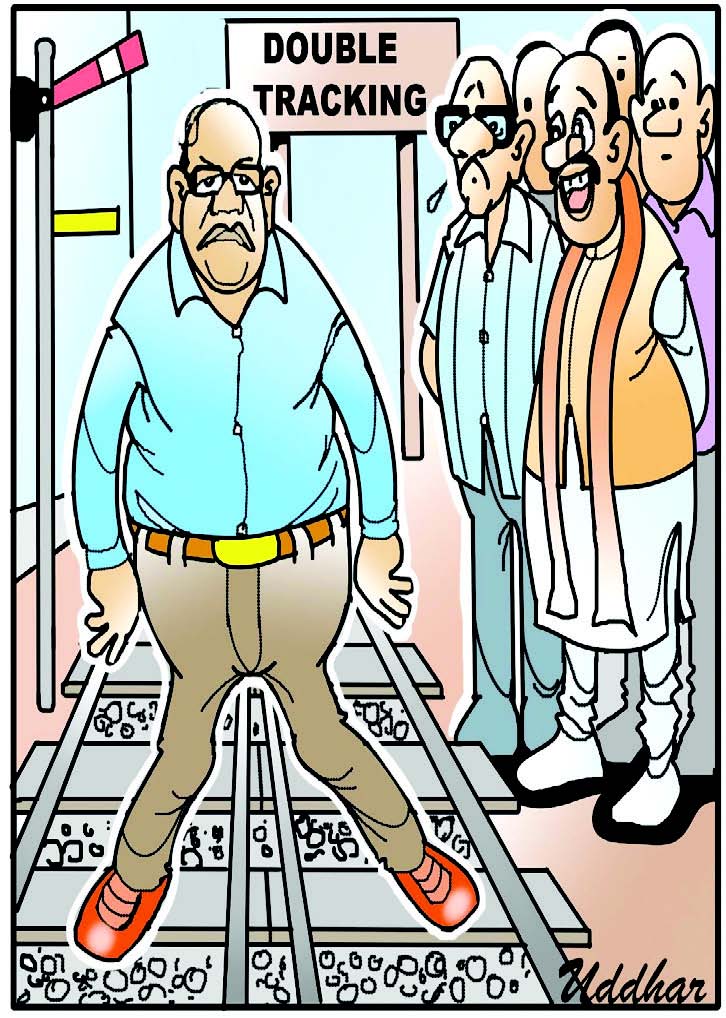
In the past week, there has been a raging debate over introducing a bill that essentially seeks to prevent the conversion of land to non-farmers for purposes other than agriculture giving a ray of hope of protecting our depleting farmlands.
This was met with a barrage of skepticism and fears of rampant misuse, including the possibility of handing over such land for the building of farmhouses.
Any legislation aimed at protecting our resources, our land, and its people is not prima facie dismissible. The problem starts when it is misused either as a form of revenge, power, or political one-upmanship. But when that happens, do lawmakers who oppose legislation fight the good fight on the streets for the people? Or is democracy always defended by heroes within our society who sacrifice all to be with the people, on the streets, in court, taking on those in power including those who were in opposition fighting for them but have now crossed fences and are allies of those who are in power? In the absence of opposition, those in the opposition are hungry to get power back. It has been left to our activist crusaders to run to the “well” of the people and fight.
This is a salute to those heroes to whom we turn whenever any law is misused and flouted for the benefit of powerful lobbies with the tacit, and at times, open support of the State. Goa has a chance because of its activism. They are the torches and shining knights who give us confidence that if there are storms of corruption and illegality with strong winds of political power play, they will stand as rocks, even at the cost of difficulty, harm, physical violence and death to themselves.
On April 15, it will be five years since the High Court asked the Goa government to reinvestigate the case of the death of the warrior priest Bismarque Dias, who supposedly drowned off the backwaters of St Estevam amidst strong and almost foolproof evidence of foul play presented by those who fought for his justice. To those who loved Goa, Bismarque was always their loved and respected “Father” irrespective of what he was officially called then. Yes, he was a priest for the people, and all priests do serve and do good. But for Father Bismarque the fields, farms, and villages of Goa were his altar.
His battle was against a massive report project on the island of Vanxim, on property that was sold by the Church to a local who in turn sold it to a hospitality group for their massive resort project. Bismarque fought a battle against this mega project on the pristine island of Vanxim till his dying day.
Incidentally, a month after his death, the project was cleared by the Investment Promotion Board, formed by the Parrikar government. At that time the warrior Bismarque’s body was in the morgue in GMC and remained there for three years, as his friends and family fought for justice before he was finally buried three years later.
Unfortunately, Mr. Parrikar’s health deteriorated post that leading to his untimely demise.
Let’s come back to Father Bismarque. With his guitar in hand, his band of musical warriors sang to spread messages to fight against mega projects in villages, the destruction of khazan lands, the protection of farmers, and so on. But there were other heroes too. And unlikely ones who stayed away from the limelight but shone the light on others. Like, Sameer Kelekar, a Goan software professional based in Bangalore supported the legal battle for his justice with his own funds. The son of the legendary Goan founder of MARG Gurunath Kelekar, Sameer saw it as a sense of duty.
Do we have politician heroes? We understand that Goa has had political leaders whose moments have been made in squares, offices, and beaches Dayanand Bandodkar was surely Goa’s first Chief Minister but wasn’t he a strong advocate of Goa’s merger with Maharashtra? Are Goans proud of a single Chief Minister who they feel has left a legacy behind for all Goans? Manohar Parrikar had his supporters undoubtedly but aren’t Goans paying for his infrastructure journey where the State’s coffers had to bleed to fund loans for the projects? The Centre was initially willing to fund the Atal Setu bridge but Parrikar said Goa would fund it. By June 2027 Goa has to pay ₹8.6644 billion back to NABARD plus the Rs 450 million annual interest even though the Centre had announced to take care of 50% of this later. The scheme burden is also being borne from the taxpayers’ pockets. The earlier easier Mamata scheme of five payouts of Rs 5,000 each for the girl child adding to Rs 25,000 when the girl turns 18 to the Dhanalakshmi scheme which provided insurance of Rs 1 lakh at 18 to the girl child was manageable. But the Laadli Laxmi scheme was not with a straight payout of Rs 1 lakh to a girl getting married.
But Goa does have street fighter heroes for whom any number of monuments and memorials during their active years will not be enough. One of the founders of Goencho Ekvott Orville Dourado Rodrigues and his comrade in arms Olencio Simoes are making rounds of police stations with the sword of arrest on their heads as a result of their stringent people’s fight against the double tracking projects. A case revolving around breaking a government JCB and preventing it from entering private property, using weapons, and instigating violence are broad charges slapped. For over two years these men and many foot soldiers have been literally living on the railway tracks to fight against the double tracking work encroaching on the Arossim church and homes. Across Goa, they have sat on dharnas, moved courts, and had arguments with government officials taking on the behemoth of the powerful States and industrial forces for whom projects like double tracking are actually.
One question plays on the minds of all these heroes. How many politicians have stood with them and have faced cases for protesting with the people? Ask Abhijit Prabhudesai of Federation of Rainbow Warriors and his team. There were thousands of people on the railway tracks of Guirdolim and the nearby Church at Chandor on the night of November 1, 2000. The young and old, the infirm and the able-bodied, normal folks and opposition politicians all gathered with candles to state in unison that double-tracking work there and elsewhere should stop. That too on a day when the crossroads were officially closed for traffic by order. The protesters squatted in the tracks with candles.
Days later criminal cases were filed against them for being a part of a large people’s protest whereas not a single politician or politically inclined figure was even questioned, let alone booked.
On another side of the state Rajendra Kerkar, writer journalist, and green warrior waged a crusade with his pen and his voice to protect the forests of the Mhadei and the River Mhadei itself. His writings and his legal interventions have worked towards a more robust debate on the diversion of the Mhadei waters and the protection of tiger habitats in conjunction with reducing man-animal conflicts. At the peak of mining violations, Kerkar’s ground investigations exposed many mining illegality. If Claude Alvares is Goa’s crusader against illegal mining. Kerkar has been a very able and accomplished ally.
Claude and Norma Alvares are one of the shining gems on the people’s crown of Goa. They will never hold an official position and will get barbs and digs from the establishment questioning their motives and finances, but the fire in their bellies will always rage through sickness and health, even as they have succeeded in putting an end to the greed-filled illegal mining which ravaged Goa.
As the land rejuvenates and a new era and template of controlled mining are about to commence, crusader Claude is on his watch again. And yes, he is training a new generation to learn and understand how this fight is fought with courses on RTI filing and understanding and interpreting the law.
This is surely not a very exhaustive list because in naming one, five others are left out. But those, who have faced the brutality of the administration in the course of their work for the people, deserve special salutations.
Hanumant Parab and the farmers of Pissurlem who have fought to stop mining trucks from plying through villages dropping their ore on their fields is a bruised soldier whose bravery did not ebb with any of the police blows.
Picked up from a protest last year he complained of being brutally thrashed by the Valpoi Police Station in charge and his boss. For over a year he has fought to get just an FIR registered against the cops. Even letters of appeal to the President and the Prime Minister of India and their letters to the government of Goa could not get a simple FIR registered against policemen who carried out extra-judicial beatings on a farmer activist who was fighting for his village and his people. Parab, speaking about the incident said, “I was beaten non-stop for 25 minutes, first the DySP hit me then the PI; the DySP told the PI, ‘Why are you just looking, hit him.’
Putting them in the spotlight is the least that we can do since they are lighthouses that steer many boats. Unlike elected politicians who are paid to serve with salaries and schemes, these crusaders, pay to serve, very often using their own savings and finances to fight for their land. And let Goans decide if those who are paid to serve have done better service than those who pay to serve.
Goa needs to bow to these selfless warriors, put them in the highest places of respect, and thank the Almighty for giving them and so many other individuals and groups who have not been mentioned but are no less important, to the land of Goa.
